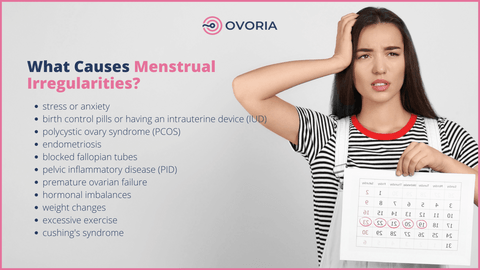Irregular Periods: Causes, Symptoms and Treatments
Around 30% of women of reproductive age experience irregular periods, meaning that millions worldwide are affected by the condition. As a consequence, it is important to gain a profound understanding of the causes, symptoms, and treatment options for women that experience irregular periods.
Every month, the female body prepares for potential pregnancy, the process known as the menstrual cycle. It starts with the thickening of the uterine lining due to increased oestrogen levels, followed by the release of an egg from the ovaries once it has reached maturity. The released egg is transferred to the fallopian tube where it eventually will get fertilised if encountered by a sperm. If fertilisation does not occur, the egg continues through the fallopian tube, and eventually perishes. At the same time, the uterine lining begins to shed its thickened layers. This process is often accompanied by blood and tissues, and marks the beginning of menstruation. Menstruation typically lasts for 3-7 days.

What Is Irregular Menstruation?
For the majority of women periods are like clockwork and are consistent in terms of length and time of month. For others, periods come early or late. The length of a menstrual cycle can range from 21 days to 35 days, while the average length of the cycle is 28 days.
If your cycle is consistently shorter than 21 days or longer than 35 days, or if there is a noticeable difference in the length of your cycles, you may be experiencing irregular periods.
What Are the Symptoms of Irregular Periods?
It's hard to define the symptoms of irregular periods, all women experience the disorder differently. But in general, any menstrual experience outside of their monthly norms could be considered irregular. Irregular menstruation is also known as oligomenorrhea.
A set of clear and concise definitions of symptoms related to irregular periods is challenging to provide due to the differences in experiences for each individual. Generally, any menstrual experience outside a woman's monthly norms can be considered irregular. There is however a set of common symptoms which may help you determine whether you are affected by irregular periods or not;
- Irregular Menstrual Periods: inconsistency in the timing of menstrual cycles, meaning the length between periods may vary.
- The Length of Menses is Less Than 21 Days or More Than 35 days: menstrual cycles outside this length of time are considered irregular, and thus indicate a disruption in the hormonal patterns regulating the menstrual cycle.
- Abnormal Uterine Bleeding: unusually heavy flow, spotting between periods, or erratic bleeding patterns indicate hormonal imbalances or other underlying issues.
- Late or Early Menstrual Period: if the menstrual period occurs outside the 28-day cycle, either arriving later or earlier than expected, it is a sign of irregular periods.
- Severe Pain: intense menstrual pain can be a symptom of irregular periods, as it often is associated with hormonal imbalances.
- Breast Tenderness: especially in the days leading up to menstruation, breast tenderness can be a symptom of hormonal fluctuations, and is commonly associated with irregular periods.
- Painful Cramping: often caused by imbalances in hormone levels leading to stronger contractions in the uterine.
Causes of Irregular Periods
There are many factors that can lead to irregular periods, with the most common cause being hormonal imbalances. Hormones like oestrogen and progesterone regulate the menstrual cycle, and fluctuations in their levels can disrupt the cycle. Possible causes of irregular menstrual cycles include;
Stress or anxiety
According to research, women who experience high levels of stress for a longer duration are more likely to experience amenorrhea - the absence of menstrual cycles.
Hormonal Birth Control Pills or Having An Intrauterine Device (IUD)
Hormonal birth control pills or Intrauterine devices can affect the menstrual cycle as they might cause hormonal imbalances. An IUD device also has potential side effects, and can lead to menstrual irregularities, pelvic pain or irregular bleeding between periods.
Endometriosis
Endometriosis is a painful disease where tissue similar to the tissue that normally lines the inside of a woman's uterus grows outside the uterus. The condition can impact the menstrual cycle through hormonal disruption and imbalances. Moreover, the disease can cause ovulatory dysfunction, ultimately causing irregular menstrual cycles.
Polycystic Ovary Syndrome (PCOS)
PCOS is a hormonal condition caused by an excess of male hormones and a deficiency of female hormones. Due to the hormonal balance, the disease is often characterised by a lack of ovulation. Consequently, it has an impact on the female reproductive system, as ovulation is a necessary step of conceiving. Women with PCOS often experience missed periods, hair loss, weight gain, or fertility problems.
Premature Ovarian Failure (POF)
Primary ovarian insufficiency, sometimes called premature ovarian failure (POF) or premature menopause, is a reproductive disorder where the ovaries stop producing eggs before the age of 40. As a consequence, women affected by the condition don't ovulate and produce below average amounts of oestrogen.
Pelvic Inflammatory Disease (PID)
Pelvic inflammatory disease is an infection of reproductive organs and can be caused by chlamydia and gonorrhoea. Symptoms of PID can include irregular or missed periods, fever, or pain in the lower abdomen.
High Prolactin Hormone Levels
High levels of the hormone prolactin can contribute to irregular periods, as it impacts the normal hormonal regulation of the menstrual cycle. The hormone's main function is to stimulate milk production in the breast, and elevated levels can affect the balance of other reproductive hormones.
Cushing Syndrome
Cushing syndrome is a disorder where the body has elevated levels of the hormone cortisol. The symptoms of Cushing syndrome can vary depending on the level of cortisol, but most women with this condition can experience acne, weight gaining, excess body hair growth or menstrual problems.
Weight Changes (rapid weight loss, rapid weight gain)
Having an unhealthy body fat percentage, whether the woman is underweight or obese, can result in hormonal disorders and irregular periods.
Chronic Illness - Underlying Health Conditions
Chronic conditions, such as diabetes or certain autoimmune illnesses, can influence the hormonal balance and thus menstrual regularity.
Excessive exercising
Women who engage in intense physical activity or excessive exercise may experience a condition known as exercise-induced amenorrhea. This disease impacts hormone production and can thus potentially cause irregular periods.
Thyroid Disorders
These disorders, both hypothyroidism (underactive thyroid) and hyperthyroidism (overactive thyroid) can impact the functioning of the reproductive system and lead to menstrual irregularities. The thyroid hormones thyroxine (T4) and triiodothyronine (T3) play an important role in regulating the menstrual cycle, and irregularities in their levels might result in irregular periods.
Eating Disorders
Disorders like anorexia nervosa or bulimia can affect the reproductive system, ultimately leading to irregular periods. As eating disorders impact the body's nutritional status and hormonal balance, they might cause irregularities in the menstrual cycle.

Diagnosis of Irregular Periods
If menstrual periods are irregular, the doctor needs to begin with a pelvic exam. Additionally, the full medical history of the patient as well as a list of all medications and supplements taken should be provided to the healthcare specialist. The doctor may recommend certain tests depending on symptoms experienced. The potential tests include;
- Blood test: a diagnostic test that will detect diseases and irregularities such as anaemia, thyroid dysfunction, or blood clotting problems.
- Endometrial biopsy: a medical procedure in which a small piece of tissue from the lining of the uterus is removed and examined under a microscope. The tissues are examined for cancer or any other tumour abnormality.
- PAP test (Papanicolaou test): is a type of cervical screening used for detecting potentially precancerous or cancerous processes in the cervix.
- Pelvic ultrasound: this diagnostic screening is used for checking the female pelvis.
- Sonohysterogram: An HSG (sonohysterogram) involves injecting fluid into the uterus to help with the creation of images. This will allow the doctor to check polyps and fibroids.
What Are the Treatments for Irregular Periods?
Option of treatment for menstrual irregularities will depend on a few factors:
- Woman's overall health
- The reasons for menstrual abnormalities
- Woman's medical history
- Lifestyle factors
- History of medical history
The approaches for treating irregular periods include:
- Medications and surgery; medical interventions, such as hormonal medications or surgical procedures, address specific underlying causes of irregular periods. This includes hormonal imbalances, PCOS, or structural issues within the woman's reproductive system.
- Alternative Medicine: herbal supplements, acupuncture, or dietary changes can be viewed as alternative medicine options to promote hormonal balance and menstrual regularity.
- Hormone therapy: birth control pills or hormone replacement therapy can regulate menstrual cycles.
- Lifestyle changes: conducting a healthy lifestyle, effectively managing stress, regular exercising, and a balanced diet not only promote overall well-being, but can also contribute to regulating menstrual cycles.
When Should You Contact the Doctor?
If you experience any of the following symptoms, it is advisable that you contact your gynaecologist or healthcare provider;
- Missed three or more periods during one year
- Short menstrual cycle
- Long menstrual cycle
- Heavy period bleeding
- Menorrhagia (bleeding for over 7 days)
- Painful menstrual periods
Irregular Periods and Pregnancy
One of the main indications of a pregnancy is a missed menstrual period. Getting pregnant prevents the shedding of the uterine lining that occurs during a menstrual period. Moreover, after a fertilised egg implants in the uterus, the sustained progesterone production prevents menstruation.
Importantly, some women experience light spotting or bleeding around the time of implantation. This can be mistaken for a light period, but is generally shorter and less intense than typical menstrual flows.

